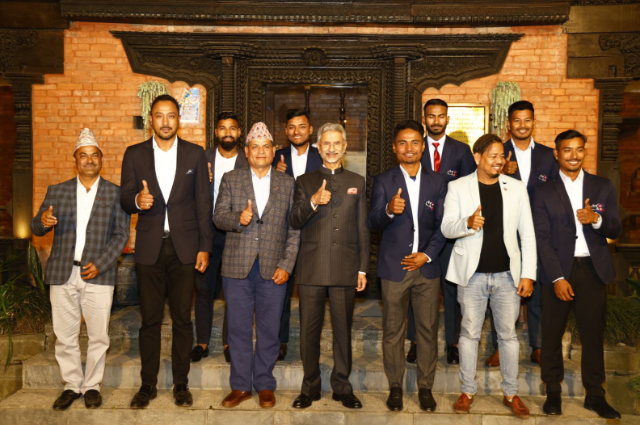India and Nepal on Thursday signed various agreements as External Affairs Minister S Jaishankar held a “comprehensive and productive” meeting with his Nepalese counterpart NP Saud and discussed overall bilateral ties, trade, connectivity projects, and cooperation in defense and security dilemmas and other things, etc.
Jaishankar, who arrived in Nepal earlier in the day on his first visit to a foreign country in 2024, co-chaired with Saud the 7th India-Nepal Joint Commission meeting.
Discussions focused on our overall bilateral ties, trade & economic relations, land, rail & air connectivity projects, cooperation in defense & security, agriculture, energy, power, water resources, disaster management, tourism, civil aviation, people-to-people & cultural exchanges, and development partnership,” Jaishankar said in a post on X.
The two sides also exchanged agreements on implementation of High Impact Community Development Projects, Long Term Power Trade, Cooperation in Renewable Energy Development, Munal Satellite, and the Handover of the 5th tranche of the post-Jajarkot earthquake relief supply.
Nepal’s Foreign Ministry said that various aspects of Nepal-India relations were discussed on the occasion under the strategic areas of economic relations, connectivity, trade and transit, power and water resources, education and culture, and political matters among others.
Earlier, Jaishankar called on President Ramchandra Paudel and Prime Minister Pushpa Kamal Dahal ‘Prachanda’ during which the two sides exchanged substantive views on the age-old, unique, and multifaceted Nepal-India relations.
The two leaders also jointly inaugurated three cross-border transmission lines.
Jaishankar called on Prime Minister Prachanda at the latter’s office ‘Singhdurbar’ and conveyed the warm wishes of Prime Minister Narendra Modi.
Nepal is important for India in the context of its overall strategic interests in the region, and the leaders of the two countries have often noted the age-old “Roti Beti” relationship.
The country shares a border of over 1,850 km with five Indian states – Sikkim, West Bengal, Bihar, Uttar Pradesh, and Uttarakhand. Land-locked Nepal relies heavily on India for the transportation of goods and services.
In June, Prime Minister ‘Prachanda’ visited New Delhi during which both sides signed several major pacts including one on increasing New Delhi’s import of power from the neighbouring country to 10,000 MW in the next 10 years from the current 450 MW.
India has helped Nepal develop multiple hydropower projects on some high-volume rivers and more projects are in progress the power export agreement comes as the next step in the bilateral relations.
According to an analysis by the Foreign Policy Research Institute, "Nepal remains uncomfortably poised between Asia's two leading powers, China and India. The longtime diplomatic rivalry between Beijing and New Delhi for political influence in Nepal now has a new focus - the country's hydropower sector."
The two sides also inked the Launch Service Agreement for the Monal Satellite developed by the Nepal Academy of Science and Technology (NAST).
During Jaishankar's visit, India announced to provide $ 75.11 million in assistance to Nepal for the reconstruction of earthquake-affected areas.
The MoU for Cooperation in Renewable Energy Development between NTPC Limited and Nepal Electricity Authority establishes a solid framework for joint efforts in the renewable energy sector.
On Friday (Jan 5, 2024), the minister was scheduled to inaugurate 59 post-earthquake reconstruction projects, including the new building of the Tribhuvan University Central Library, a testament to the collaborative efforts with the grant assistance of the Government of India.
. . .
Reference:
- timesofindia.indiatimes.com
- financialexpress.com
- indianexpress.com

